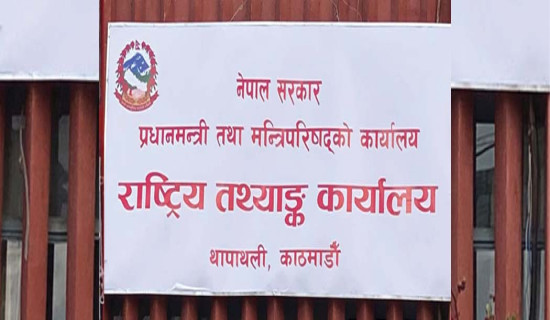- Monday, 26 January 2026
Cumin seeds prices almost halve in two months
Kathmandu, Feb. 27: The price of cumin seeds (jeera), the common condiment of Nepali kitchens, has decreased substantially in recent weeks. Consumers, who were affected by the sharp rise of cumin price in the last six months have felt a sigh of relief with the fall in its price.
However, many local retailers are found selling the spice at a higher price even after its price almost halved in the last one and a half months. The price of cumin has dropped by half from Rs. 1,600 per kg to Rs. 800 in two months, said traders.
The price of cumin seeds had skyrocketed in the local market since November 2022. The price of cumin seeds reached up to Rs. 1,600 per kg in the retail market. But now, its price has dropped to Rs. 800 per kg. Dharma Mainali, a retailer of Gatthaghar of Bhaktapur, said that cumin seeds are now being sold at Rs. 800 per kg.
"The price of cumin in the local market, which started falling from January 2024, has now dropped by 50 per cent to Rs. 800 per kg. Till December 2023, a kg of cumin was up to Rs. 1,600 in the local market," he told The Rising Nepal.
The price of cumin, which was up to Rs. 450 per kg till October 2022, had climbed up to Rs. 1,600 per kg by 2023. Owing to decreasing production of cumin seeds in India, its price had increased abnormally in India and its impact was seen also in Nepal. Nepal is almost totally dependent on import to meet the demand for cumin.
He said that since the price of cumin is likely to decrease further, he will bring only a small quantity and sell it. He said that the price of cumin has decreased every time they purchase from the wholesale market for the last one and a half months.
Amul Kaji Tuladhar, general secretary of Nepal Retailers’ Association, said that the price of cumin seeds dropped to Rs. 750 per kg within one and a half months. He said the price of cumin seeds has decreased in the local market after a decline in its price in India.
The Indian media reports have also shown the price of cumin seeds fall by 50 per cent there. The fall was due to anticipation of a bumper harvest, they said. Almost 85 per cent cumin seed consumed in Nepal is being imported from India, while the remaining 15 per cent come from other countries, Tuladhar said.
"We do not know the reason for the sudden decrease in the price of cumin and its fluctuation. But according to the wholesalers, the price has decreased in the international market and so does the price here in the local market," he said.
Increasing consumption
Tuladhar said that the consumption of cumin, which decreased sharply after price rise, has started to increase with the fall in its price. "After the price increase, the consumption of cumin had decreased by almost half, the customers who bought 1 kg of cumin at a time started buying half a kg, while the customers who bought half a kg started buying only 200 grams," he said.
He said that the demand for cumin seeds is gradually increasing due to the fall in prices and will return to normal within a few months. Due to price hikes, the import of cumin seeds had decreased in the last several months of the current fiscal year as compared to the same period last year.
However, the import of cumin seeds has been increasing for the past two months after a fall in its price. In terms of quantity, the import of cumin is lower only by 18 per cent in the first seven months of the current fiscal year as compared to the same period last year.
However, the import of cumin had decreased by almost by 50 per cent in the first two months of the current fiscal year (September/October 2023) as compared to the same period previous fiscal year. During the first seven months of the current fiscal year, the country imported 2,805 tonnes of cumin worth Rs. 1.43 billion.
However, the country had imported 3,456 tonnes of cumin seeds worth Rs. 940 million during the first seven months of the last fiscal year. It shows that the import of cumin has been increasing gradually with the decline in its price in the international market, especially India.




-square-thumb.jpg)












